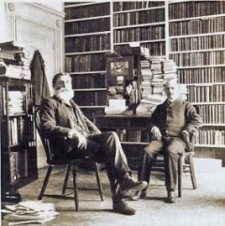 (From chapter seven of my dissertation, The Lion of Princeton)
(From chapter seven of my dissertation, The Lion of Princeton)
In the forward to fellow Presbyterian Francis Beattie's book Apologetics: or the Rational Vindication of Christianity, Warfield, ironically, if not prophetically, anticipated much of the criticism which would be leveled at him by those who are in many ways his direct theological descendants. It is primarily based upon Warfield's remarks about reason in this essay that many of his critics have reached their negative assessment about Warfield's apologetic. A brief evaluation of Warfield's essay will be extremely helpful in determining many of Warfield's own views on these matters, since Warfield specifically discusses several of the issues under debate.
Lamenting the twin enemies of rationalism and mysticism, Warfield notes,
The mystical tendency is showing itself in our day most markedly in a wide-spread inclination to decline Apologetics in favor of the so-called testimonium Spiritus Sancti. The convictions of the Christian man we are told, are not the product of reasons addressed to the intellect, but are the immediate creation of the Holy Spirit in his heart. Therefore, it is intimated, we can not only do very well without these reasons, but it is something very like sacrilege to attend to them. Apologetics, accordingly, is not merely useless, but may even become noxious, because tending to substitute a barren intellectualism for a vital faith.
Many of these same charges have been leveled against Warfield himself.
Quickly dismissing the rationalists, since what they need is "not less Apologetics but more Apologetics," Warfield indeed seems quite perplexed about the role of apologetics proposed in the Encyclopedia of Sacred Theology, recently published by Abraham Kuyper. There are two primary issues about which Warfield takes issue with his esteemed Dutch friend. First, Warfield is concerned that Kuyper has adopted a "mystical" conception of apologetics, which in effect, results in the practical depreciation of apologetics altogether. Second, Warfield is concerned that Kuyper's understanding of theological encyclopedia is unduly confused, and may in fact, amount to a departure from historic Reformed practice.
To read the rest of this essay, click here
 Tuesday, November 17, 2009 at 08:15AM
Tuesday, November 17, 2009 at 08:15AM 












